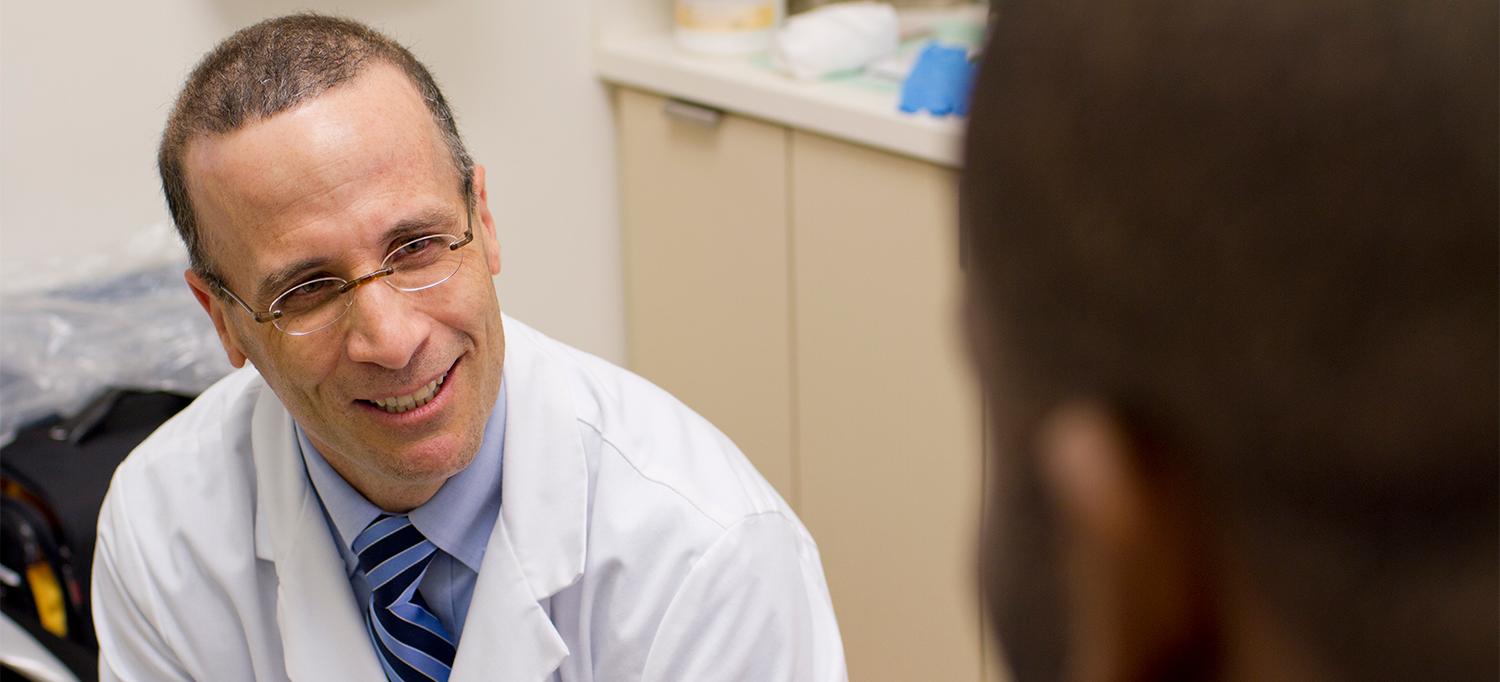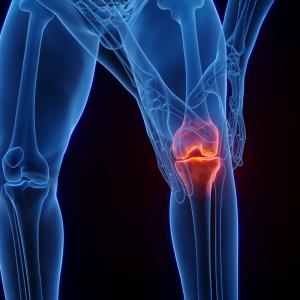
Dr. Dennis A. Cardone leads a team of primary care sports medicine doctors who provide active people with not only diagnosis and treatment of injuries and illness, but also advice and support for their athletic endeavors.
Photo: NYU Langone Staff
You smashed your big toe during a game of kickball, and it really hurts. Or maybe you have a case of what you suspect is tennis elbow. Perhaps you want to start playing basketball, but aren’t sure it’s safe because you have high blood pressure.
An injury or a health concern can keep you from getting back in the game, whether as part of a team or an elite sport or simply a recreational activity like running or working out at the gym. You may think your regular doctor or a visit to an orthopedic surgeon are your only options, but this is where sports medicine comes into play. A primary care sports medicine doctor provides specialized and comprehensive care catered specifically to athletes, active people, and those who want to be more active.
You don’t have to be a professional or even a serious athlete to take advantage of a primary care sports medicine doctor’s skills and expertise. Here’s why every active person needs this specialist on their healthcare team.
You Are Injured or Want to Avoid Injury
Whether they are physicians trained as internists, pediatricians, or emergency or family medicine physicians, these specialists have pursued additional training for board-certification in sports medicine, explains Dennis A. Cardone, DO, chief of NYU Langone’s Division of Primary Care Sports Medicine in the Department of Orthopedic Surgery and co-director of its Sports Medicine Center.
“We have special training and expertise in diagnosing and providing nonsurgical treatment for common musculoskeletal injuries—think garden-variety athletic injuries like strains and sprains, tendinitis, and fractures,” says Dr. Cardone, who is also chief medical officer of the New York City Public Schools Athletic League.
Ninety percent of sports injuries—golfer’s elbow, Achilles tendinitis, or minor osteoarthritis in the knee, to name only a few—don’t require surgery. Treating those types of injuries and conditions are a primary care sports medicine doctor’s area of expertise. And so is preventing them. A primary care sports medicine doctor has a complete arsenal of knowledge about how you can use strength and cross-training, diet, and orthotics to fend off problems that put you on the bench.
You’re an Athlete with a Health Issue
There are athletes at the highest levels of sports who compete while also managing conditions such as asthma, hypertension, atrial fibrillation, and type 1 or type 2 diabetes. Each of them receives specialized care for their condition that focuses not only on maximizing their athletic potential but also their overall health and wellbeing. That is exactly what a primary care sports medicine doctor does for you.
“We care for the whole athlete,” says Dr. Cardone. “We understand the relationship between overall health and athletic performance, whether your sport is basketball, Little League Baseball, golf, or even walking. We work to help you optimize both.”
Dr. Cardone says he and his colleagues work with people who have a variety of ongoing health concerns to support their athletic endeavors. “We see women experiencing irregular periods or bone-density problems, athletes with eating disorders, and runners who suffer from diarrhea during workouts,” he says. “It runs the gamut, and there’s not a lot we haven’t seen.”
Apart from caring for people with chronic concerns, primary care sports medicine doctors are a resource for those recovering from mild or serious illness or injury. They’ll help you determine when and how to safely return to your sport or activity.
Your Performance Is Suffering—and You’re Not Sure Why
Oftentimes it’s simple to figure out why your athletic performance has tanked. Injury, illness, and stress are common culprits, and by addressing those issues, you can usually return to your previous form.
But what happens when you don’t know why you’re suddenly winded during a short run, your usual swim feels exhausting, or that weight you easily lifted a month ago now seems very heavy? “Decreases in strength, endurance, or overall energy are all reasons to see a primary care sports medicine doctor,” says Dr. Cardone. “We have specialized diagnostic tools to determine the root cause of your symptoms, whether it’s an underlying illness or infection, nutritional deficiency, overtraining, or something else, and we work to get you back to 100 percent.”
You’re in Pain
Athletes and other active people are familiar with “good” pain: the soreness and stiffness that comes a day or two after a hard workout. They’re also notorious for ignoring or trying to play through the not-so-good pain. “We see it all the time,” says Dr. Cardone, “in weekend warriors as well as elite athletes. They say, ‘I’ll wait it out, it’ll get better.’” But some types of pain can indicate or lead to a more serious or permanent injury.
Those include pain that persists or worsens after a few days, even with at-home treatment. The first symptom of a stress fracture, for instance, may be nothing more than tenderness or a dull ache, but without proper treatment can progress to a full break. The same pertains to overuse injuries such as Achilles tendinitis, shin splints, runner’s knee, iliotibial band syndrome, or plantar fasciitis, which can start with only discomfort but progress to problems that can keep you out of action for a prolonged period.
Pain that comes on suddenly and sharply, compromises your form or range of motion, or is accompanied by unusual swelling is another good reason to head to a sports medicine doctor.
“Don’t take chances with pain,” says Dr. Cardone. “When in doubt, see your doctor. Nine times out of ten, there’s a nonsurgical solution for these injuries.”
You Want to Stay Active in the Long Run
The fear of being told to lay off a sport or activity while an injury heals or an illness runs its course keeps many active people away from the doctor’s office. Primary care sports medicine doctors prioritize your ability to remain active while caring for injuries and illness. If a doctor does recommend time off from your sport, says Dr. Cardone, “we create a treatment plan that includes appropriate cross-training to help you maintain the fitness you’ve built until you can return to your chosen activity.”
Primary care sports medicine doctors focus on more than the short-term goals of healing. Says Dr. Cardone, “We’re invested in keeping you fit and active for life.”
Learn more about Sports Health services for children and adults at NYU Langone and make an appointment with a primary care sports medicine doctor.

